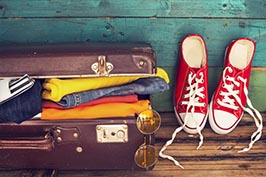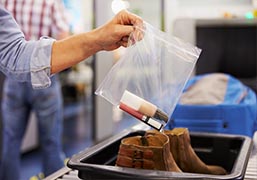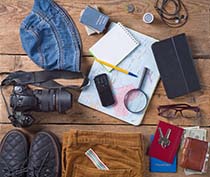How To Avoid Baggage Problems
How To Avoid Baggage Problems
 Relatively few bags are damaged or lost. However, your chances of encountering this experience can be reduced even further if you follow the advice set out below.
Relatively few bags are damaged or lost. However, your chances of encountering this experience can be reduced even further if you follow the advice set out below.
- Packing
- Your Checked-in Baggage
- Carry-on Baggage Advice
- Claiming your bags
Packing
It’s important to remember that if you’re traveling a very long way, whether it’s an internal flight or to a foreign country, that you probably won’t see your checked-in luggage for quite some time so if there are a few things that you must have with you for the journey, make sure that they’re in your carry-on bag and not in you checked-in luggage.
Your Checked-in Baggage
Your Checked in Bags
- Check the baggage weight limit, you’ll find this on the airline’s website – it sometimes differs between short- and long-haul flights
- Don’t overpack. This puts pressure on the latches, making it easier for them to spring open. And don’t pack to close to the weight limit – your scales may differ from the airline’s and anyway, you’ll probably want to bring your souvenirs home with you and you don’t want to incur an excess baggage charge for them.
- Security checks: Your checked bags may need to be opened for a security inspection out of your presence. If you wish to lock your bags, see www.tsa.gov for information on locks that security personnel can open and then re-lock. If you use an unapproved lock and your bag is selected for inspection, the security staff will break the lock if necessary.
- Put tags on your bags with your name, destination address, and home, cell phone and work phone numbers. Unless your bag label is a ‘privacy’ label where the details are concealed, don’t display your home address on your bag tags. Airports are often cruised by criminals looking for opportunities and it they see your address on a bag at check-in, they’ll know you’ll be away for at least a few days – yoou may come home to an empty house.
- Put the same information inside each bag, and add an address and telephone number where you can be reached at your destination city.
Avoid putting the following in checked-in baggage:
- Your Passport. This absolutely mandatory. When you check your bags in at the airport you may be asked for your passport so you’ll simply have to open your big bag and get it out. And don’t put it back in after the check-in assistant has looked at it. If you have adjoining flights at different terminals at an interim airport and your bags have been checked through to your final destination then you’re in trouble if you get asked for your passport at the next security check-in
- Valuables & Gadgets (cash, jewellery, anything irreplaceable). Don’t rely on suitcase locks; they are easily defeated. Very occasionally, checked in bags are delayed or go missing in transit and even more occasionally, they might be broken into and items stolen, so keep your valuables on your person or in your carry-on bags.
- Critical Items (medicine, keys, passport, tour vouchers, business papers). Probably the most important here is medicine. If you’re on a long haul flight and have to take prescription drugs every few hours, you’ll be in trouble if your medicine is in the hold; keep enough for the duration of the flight in your carry-on hand luggage.
Even if a bag is not lost, it may be delayed for a day or two. It is wise to put items that you will need during the first 24 hours in a carry-on bag (toiletries, one change of underwear). - Fragile items (camera, eyeglasses, glass containers). Baggage handling at main airports these days is largely automatic but there’s still an element of bags being ‘hand-balled’ into the hold and baggage handlers can be quite rough with bags and large suitcases. If you must check a fragile item in with your large bags, make sure you, wrap them carefully in padding – use your clothing.
- Perishables (food etc) Most foreign countries won’t allow you to bring food into the country for fear of cross contamination of agricultural pest or diseases so you’ll simply be asked to discard it when you get to custome; you may even be fined.
It is worth noting that travel insurance would not cover most of these items if they were in your checked-in baggage.
Carry-on baggage advice:
- Check with the airline for any limits it has on the size, weight, or number of carry-on bags. There is no single federal or international standard and if part of your itinerary includes a flight in a small plane, there may be very restricted space in the overhead lockers so enquire about your flight; different airplanes can have different limits and if you are using more than one airline for a trip, check on all of them.
- A heavy bag which fits in an overhead bin may still cause the bin to exceed its weight limit. And if you’re small and the bag is big, can you hoist it over your head without assistance?
- If your carry-on bag is too big, it may be rejected and the airline will insist that you check it into the hold. In which case, you’ll have to decant all of the things that you’ll need on the flight (see above) such as medicines, books etc and put them in your pockets.
- Dangerous Items: Don’t pack anything in a carry-on bag that could be considered a weapon (e.g., scissors, knife). They’ll simply be detected at airport security
Check-In
- Don’t check in at the last minute. Even if you make the flight, your bag may not.
- Make sure that you get a claim check for every bag that you check. Look after them and don’t throw them away until your bags are returned and you have had a chance to check them. Not only will you need them if a claim is necessary, but you may need to show them to security upon leaving the baggage-claim area. Don’t leave them in the seat-pocket on the airplane.
- Verify that the agent checking your bags attaches a destination tag to each one. (Remove destination tags from previous trips to avoid confusion.) even though most airline destination bag labels are generate by the computer which identifies you, your flight and your destination and mistakes are nowaday very rare you should still check to see that these destination tags show the correct three-letter code for the destination airport where you expect next to see your bags.
It’s particularly important if you are checking your bags through to a final destination across a multi-flight itinerary and equally so if you’ll be expected to collect your bags and transport them yourself to a connecting flight where they’ll need to be checked in again.
Know where your bags are checked to. They may be checked only to one of your intermediate stops rather than your final destination if:
• you must clear Customs short of your final destination, or
• you are taking a connecting flight involving two airlines which don’t have an interline agreement (e.g., Southwest Airlines does not transfer bags to other carriers).
Claiming Your Bags
- Open or damaged bags: If your bag arrives open, unlocked or visibly damaged, check immediately to see if any of the contents are missing or damaged.
- Missing bags: If your bag is missing, it is the airline’s responsibility to compensate you. Most baggage handlers will attempt to persuade you that you should claim your bag on your travel insurance but this is absolutely not so – they just want to get rid of you and once you’re out of the baggage hall, you can’t go back in. Some travel insurers won’t cover lost bags if they were in the possession of the airline when they went missing simply because if they did, airlines would never bother to get bags to where they’re meant to be.
- Report any problems to your airline before leaving the airport. Insist that the airline fill out a form and give you a copy, even if they say the bag will be in on the next flight. Get the agent’s name and an appropriate telephone number for following up (not Reservations).
It’s not unusual for the airline to take your claim checks when you report the problem; simply make sure this is noted on all copies of the report. - Before leaving the airport, ask the airline if they will deliver the bag without charge when it is found. Also ask about an advance or reimbursement for any items you must buy while your bag is missing.
- Open your suitcase immediately when you get to where you are staying. Report any damage to contents or pilferage immediately by telephone. Make a note of the date and time of the call, and the name and telephone number of the person you spoke with. Follow up immediately with a certified letter.
